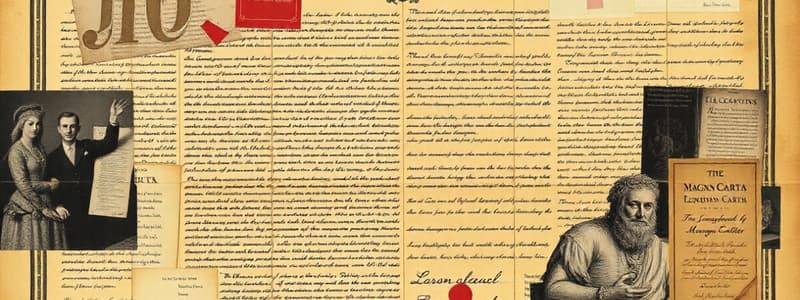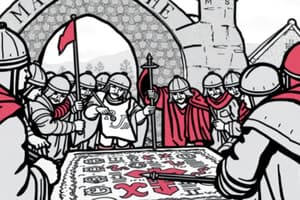Podcast
Questions and Answers
What does 'Magna Carta' mean in Latin?
What does 'Magna Carta' mean in Latin?
- Royal Decree
- Noble Law
- Great Charter (correct)
- Peace Agreement
The Magna Carta was signed in 1215 by King George.
The Magna Carta was signed in 1215 by King George.
False (B)
How many clauses are contained in the Magna Carta?
How many clauses are contained in the Magna Carta?
63
The barons believed that King John was a _____ king.
The barons believed that King John was a _____ king.
Which of the following was not a demand made by the barons that was included in the Magna Carta?
Which of the following was not a demand made by the barons that was included in the Magna Carta?
The right to a trial by jury was one of the universal rights outlined in the Magna Carta.
The right to a trial by jury was one of the universal rights outlined in the Magna Carta.
What significant document did the Magna Carta influence in the United States?
What significant document did the Magna Carta influence in the United States?
Magna Carta is also known as The Great _____ .
Magna Carta is also known as The Great _____ .
Match the following issues with the corresponding clauses from the Magna Carta:
Match the following issues with the corresponding clauses from the Magna Carta:
What was a common belief about the Magna Carta held by many people for hundreds of years?
What was a common belief about the Magna Carta held by many people for hundreds of years?
What year was the Human Rights Act passed in the UK?
What year was the Human Rights Act passed in the UK?
The Universal Declaration of Human Rights is legally binding in all countries.
The Universal Declaration of Human Rights is legally binding in all countries.
What does Article 10 of the European Convention on Human Rights protect?
What does Article 10 of the European Convention on Human Rights protect?
The United Nations was established after the end of _____ to promote peace and security.
The United Nations was established after the end of _____ to promote peace and security.
Match the following rights with their descriptions:
Match the following rights with their descriptions:
Which of the following is an example of a civic duty in the UK?
Which of the following is an example of a civic duty in the UK?
Members of the tribunal system in the UK are legally trained judges only.
Members of the tribunal system in the UK are legally trained judges only.
What are the powers held by the five permanent members of the United Nations Security Council?
What are the powers held by the five permanent members of the United Nations Security Council?
The right to life is guaranteed under Article ___ of the European Convention on Human Rights.
The right to life is guaranteed under Article ___ of the European Convention on Human Rights.
What is the purpose of a potential British Bill of Rights as proposed?
What is the purpose of a potential British Bill of Rights as proposed?
What is a legal right of an employee?
What is a legal right of an employee?
A child has a moral right to an education.
A child has a moral right to an education.
What responsibility do you have if you have the right to a safe environment?
What responsibility do you have if you have the right to a safe environment?
At the age of 16, a person can buy a ______.
At the age of 16, a person can buy a ______.
Match the following age-related laws with their respective rights or responsibilities:
Match the following age-related laws with their respective rights or responsibilities:
Which of the following is considered a moral duty?
Which of the following is considered a moral duty?
You have the right to free speech without any responsibilities.
You have the right to free speech without any responsibilities.
Name one responsibility of parents in the home-school agreement.
Name one responsibility of parents in the home-school agreement.
The legal age to vote in Scotland is ______.
The legal age to vote in Scotland is ______.
What is one legal consequence of breaking the law?
What is one legal consequence of breaking the law?
Flashcards
Universal Declaration of Human Rights
Universal Declaration of Human Rights
A set of 30 basic rights and protections for everyone globally, regardless of background.
Human Rights Act 1998 (UK)
Human Rights Act 1998 (UK)
UK law ensuring individuals can defend rights in court, and public organizations must treat everyone fairly.
British Bill of Rights
British Bill of Rights
Proposed UK law intended as an alternative to the Human Rights Act, possibly weakening rights protections.
European Convention on Human Rights (ECHR)
European Convention on Human Rights (ECHR)
Signup and view all the flashcards
Civic Duties
Civic Duties
Signup and view all the flashcards
Right to a fair trial
Right to a fair trial
Signup and view all the flashcards
Democracy
Democracy
Signup and view all the flashcards
United Nations
United Nations
Signup and view all the flashcards
Discrimination
Discrimination
Signup and view all the flashcards
Tribunals
Tribunals
Signup and view all the flashcards
Magna Carta
Magna Carta
Signup and view all the flashcards
King John
King John
Signup and view all the flashcards
English Barons
English Barons
Signup and view all the flashcards
Clauses of Magna Carta
Clauses of Magna Carta
Signup and view all the flashcards
Trial by Jury
Trial by Jury
Signup and view all the flashcards
Limited Monarchy
Limited Monarchy
Signup and view all the flashcards
Unpopular King
Unpopular King
Signup and view all the flashcards
Protecting Rights
Protecting Rights
Signup and view all the flashcards
Taxation
Taxation
Signup and view all the flashcards
Historical Perspectives
Historical Perspectives
Signup and view all the flashcards
Legal Rights
Legal Rights
Signup and view all the flashcards
Moral Rights
Moral Rights
Signup and view all the flashcards
Rights & Responsibilities
Rights & Responsibilities
Signup and view all the flashcards
Home-School Agreement
Home-School Agreement
Signup and view all the flashcards
Age-Related Laws
Age-Related Laws
Signup and view all the flashcards
16+ Rights
16+ Rights
Signup and view all the flashcards
18+ Rights
18+ Rights
Signup and view all the flashcards
Citizen Duties
Citizen Duties
Signup and view all the flashcards
Conflict of Rights
Conflict of Rights
Signup and view all the flashcards
Employment Rights
Employment Rights
Signup and view all the flashcards
Study Notes
Magna Carta
- Magna Carta, Latin for "Great Charter," is a 1215 document of English Barons' demands.
- It contained 63 clauses, many addressing complaints about King John's rule.
- Some clauses remain part of modern English law.
- King John was unpopular for excessive spending on wars, high taxes, and perceived weakness.
- Barons' demands, recorded in Magna Carta, limited royal power in several ways.
- They included clauses for return of confiscated property, ensuring justice, preventing forced remarriages of widows, and avoiding punishment without trial.
- Clause on inheritance tax stated a £100 tax on inheritance of Baron's property.
- Magna Carta profoundly influenced development of rights in England, UK, and globally.
- It shaped democratic principles and influenced major legal documents worldwide.
- Historians now view Magna Carta more as a document designed to assert baronial control than to champion commoner rights.
- Magna Carta has been said to have influenced legislation and declarations across the world including the American Bill of Rights and the Universal Declaration of Human rights.
Human Rights
- After World War II, global concern for human rights led to the Universal Declaration of Human Rights (UDHR) in 1948.
- The UDHR, a 30-point document, outlines universal rights for all, regardless of race, gender, or background.
- It isn't legally binding but has profoundly influenced legal systems worldwide.
- The 1998 UK Human Rights Act enshrined European Convention on Human Rights (ECHR) to UK law, ensuring protection and equal treatment under the law.
- The UK government now seeks to replace the Human Rights Act with a British Bill of Rights, potentially weakening certain rights and freedoms potentially allowing politicians to decide when fundamental rights apply.
United Nations
- The United Nations, created after World War II, aims for global security and humanitarian aid.
- The UN Security Council includes five permanent members (UK, USA, France, Russia, China), each with veto power, and 10 non-permanent members.
- Key historical dates related to human rights and the UN include:
- 1945: End of World War II, UN formation
- 1948: UDHR drafted
- 1950: Council of Europe creates ECHR and ECtHR
- 1998: UK adopts Human Rights Act
Civic Duties and Rights
- Civic duties fulfill obligations in a democracy, although often not explicitly stated.
- Examples include obeying the law, paying taxes, not harming others, reporting crimes, respecting government, voting, serving on a jury, and fulfilling role-specific duties.
- Rights and responsibilities are often intertwined (e.g., right to a safe environment, responsibility for safety rules).
- Conflicts between rights (e.g., free speech vs. avoiding racial discrimination) can arise.
- Some key legal rights are from ECHR, under the Human Rights Act 1998, relating to life, liberty, fair trial, and private life.
- Rights of various groups—employees, consumers, police, etc.—are listed in other legal sources
- Home-school agreements outline rights, responsibilities for parents, students, school.
Age-Related Laws
- Age limits are set and sometimes raised by governments.
- Examples include raising minimum tobacco purchase age from 16 to 18 in 2007, and increasing pet purchase age in 2006.
- Voting age has decreased in the UK over time, with differing rules across regions (16 in Scotland).
- Different age laws are applicable in various categories including, work, accessing certain products, services, driving, and consent to medical/legal actions.
Tribunals
- Tribunals are part of the UK civil system, dealing with disputes like employment, immigration, and mental health.
- They are faster and less formal than civil courts.
- Tribunals are often chaired by judges with lay members, typically three individuals with relevant knowledge.
- Lay members get a small fee, expected to work fifteen days a year.
- Decisions in local tribunals can be appealed to an upper tribunal.
Police Service
- No formal educational requirements are needed for entry to the UK police service.
- Training is mostly on-the-job.
Specific Examples of Rights
- Employment rights
- Consumer rights
- Police rights
- Employee rights
- Employer association rights
- Political rights
- Legal rights
- Moral rights
- Social rights
- Human rights
Studying That Suits You
Use AI to generate personalized quizzes and flashcards to suit your learning preferences.




